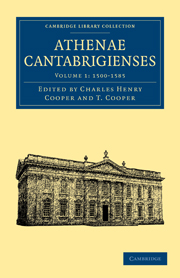ATHENAE CANTABRIGIENSES, VOLUME 1: 1500-1585, PART 1 P. 1-190
Published online by Cambridge University Press: 10 November 2010
Summary
THOMAS ROTHERAM, sometimes for a reason which does not distinctly appear, called Scot, son of sir Thomas Rotheram, knt., and Alice his wife, was born at Rotherham in Yorkshire, on the feast of S. Bartholomew, 1423. After being educated in his native town under an able master, whose name has unfortunately not been preserved, he removed to King's college, whereof he was appointed one of the original fellows 1443. He subsequently became rector of Ripple in Kent, and provost of the college of Wingham in the same county. The latter preferment he resigned in 1463. He proceeded D.D. 1460, and in 1463 was incorporated in that degree at Oxford. In 1465 he obtained the rectory of S. Vedast, London. He was chaplain to Edward IV., secretary of state, and keeper of the privy seal, and was consecrated bishop of Rochester in 1468, in which year he became provost of the collegiate church of Beverley. This dignity he appears to have retained till 1472. In 1468 he was ambassador to France, and the next year was elected chancellor of this university, which office he again held in 1473, 1475, and 1483. From Rochester he was in 1471 translated to Lincoln, and before his confirmation went on an embassy to Burgundy. In Feb. 1473-4 he was constituted lord high chancellor of England. He accompanied the king to France on the inglorious expedition which terminated in the peace of Pecquigni, and the negociations between the duke of Burgundy and Louis XI. were chiefly entrusted to him.
- Type
- Chapter
- Information
- Athenae Cantabrigienses , pp. 1 - 190Publisher: Cambridge University PressPrint publication year: 2009First published in: 1858



